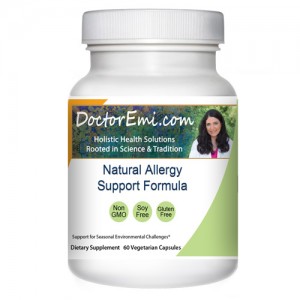Seasonal Allergies
Springtime is a beautiful time of year, but, sadly, cannot be enjoyed to the fullest by seasonal allergy sufferers. The spectacular flowering trees in the Pacific Northwest are the harbingers of Rye Grass, Rag Weed, Timothy Grass, and other bothersome allergens. The effects of seasonal allergies can range from minor annoyance, to near incapacitation for some individuals. People with hypersensitive immune reactions often experience physical, mental, and functional decline even with moderate onset of discomfort.1 Understandably, many people turn immediately to over-the-counter or prescription medications for relief – mainly, H1-antihistamines (also called “H1 Blockers”) which block the action of histamine (the chemical the body produces in response to allergens which causes runny nose, sneezing, etc).2
The Little-Known Side Effect of OTC and Prescription Antihistamines
Weight Gain

Most seasonal allergy sufferers already know that common over-the-counter and prescription antihistamines can cause side effects such as drowsiness, dizziness, and dry mouth (to name a few). However, many people aren’t aware they can also cause weight gain.3 A study using data from the National Health and Nutrition Examination Survey (NHANES) states: “For both males and females using prescription H1 antihistamines, the odds of being overweight were significantly increased, respectively.”4 Antihistaminic activity can increase appetite and affect insulin levels.5
Consider a Natural, Side Effect-Free Approach

Are you are looking for a natural approach to your seasonal allergies – one without the side effects? Doctor Emi’s Natural Allergy Support Formula provides fast-acting, natural support for seasonal allergy sufferers of watery, itchy eyes and runny nose, as well as other manifestations of histamine release. Formulated with a combination of bioflavonoids, micronutrients, proteolytic enzymes, herbs, and bromelain, Natural Allergy Support Formula addresses the distressing signs of immune hypersensitivity. Research indicates that the natural components in Natural Allergy Support Formula, including vitamin C, bioflavonoids, DHQ, NAC, and bromelain, work together to attenuate unpleasant immune reactions caused by seasonal allergies.6,7,8,9
Please consult your physician before beginning this, or any dietary supplementation. Do not use this product if you are pregnant or lactating.


